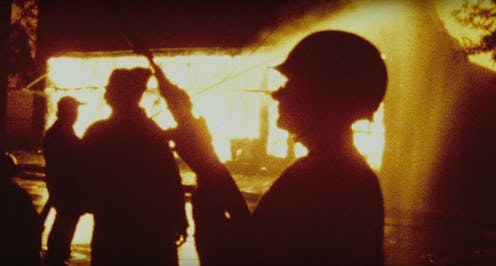Entertainment
'Detroit' Shines A Spotlight On One Of The '60s Darkest Times
The upcoming film Detroit focuses on a single evening during the infamous riot that paralyzed the city 50 years ago. Although The Detroit Free Press reports that the Detroit riots lasted five days, a little longer if you count the time it took to roll back the occupying Army and National Guard, Kathryn Bigelow's movie shows that even a single moment can impact a city's entire history. The Detroit riots may have been decades ago, but we're still reeling from the time period today, especially the events highlighted in the new film.
Detroit brings the evening of July 25, 1967 to the screen. On the riot's third night, police raided the Algiers Motel following a shot heard inside. Three young men were killed, and nine other teenagers were beaten, humiliated, and psychologically tortured. One death, as the New York Review of Books reports, remains unexplained to this day. But as tragic as it was, the Algiers Motel Incident, as it came to be known, was just a single event during the riot's midpoint. Elsewhere that same night, troops requested by Governor George W. Romney were deployed, and Lyndon B. Johnson called in federal forces to occupy the city.
To those who weren't under constant social oppression, the riot might've seemed to have started from nothing; according to the L.A. Times, it was a usual 3 a.m. raid of a speakeasy in the notorious 12th Street district. The area was known for illegal gambling, prostitution, and other vices, and so raids were common. What wasn't common were the 82 people crammed into the small space — the officers had crashed a large party celebrating the return of two GIs from Vietnam. Deciding on a sweeping arrest, they put the maximum 14 people into a paddywagon, and stood outside with the remainder.
As they waited for additional wagons, the surrounding crowd grew ugly. Tensions mounted, as the police force at the time was 95 percent white, while the crowd, neighborhood, and Detroit was majority black, with 12th Street in one of the poorest districts. Riots had recently happened in California and Newark, but Detroit had avoided any major incidents since the race riots of 1943.
What was presumed "model behavior" from the city was only suppressed, simmering resentment at its systematic racism. The Detroit Press reported that as police paddywagons filled with arrested revelers, a bottle flew through the air, aimed at an officer. It instead smashed on the sidewalk, shattering the illusion of complacency and sparking the riot.
Detroit 's tagline, "It's Time We Knew" speaks to that illusion. Presented by many at the time as out-of-nowhere violence perpetrated by thugs and hooligans, the five days of rioting were a brief rebuke to decades of oppression. Though it focuses on a single incident in time, Detroit is named after the entire city and its history, still reeling from that week. 50 years later, events happening all over the U.S. parallel stories from the riot only now coming to wider public attention. The adage about being doomed to repeat history we don't, or can't, learn from is right — it's time we knew.
